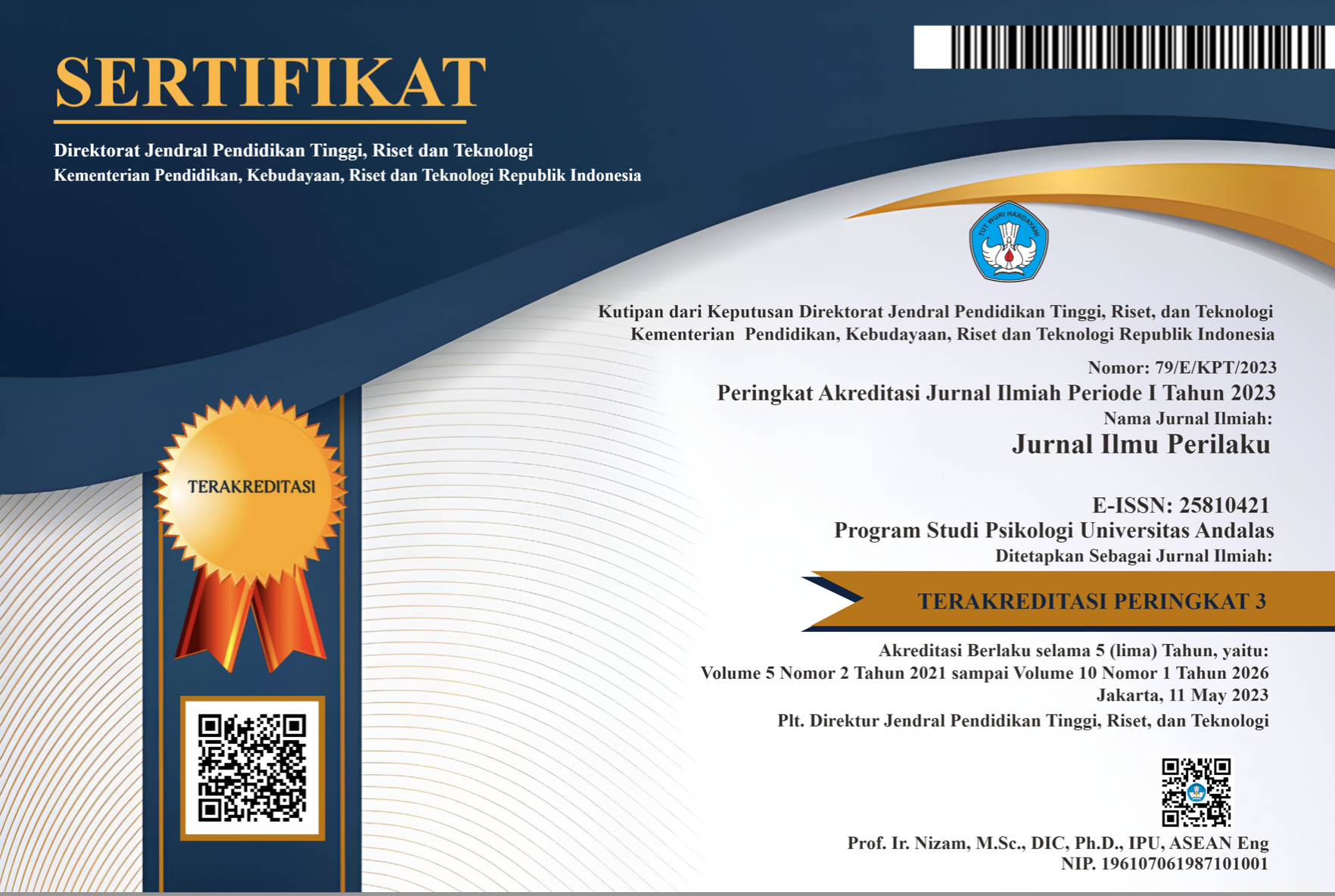Menulis Naratif Dengan Menjaraki-Diri Mampu Menurunkan Gejala Depresi
Abstract
This research wants to find out whether there is a significant effect of writing techniques using own-name, as an intervention to reduce the level of depression. Subjects were young adults with moderate depression. Two interventions were carried out namely expressive writing and narrative self-distancing. The total of participants were 5, 2 participated in expressive writing interventions and 3 others participated in self-distancing narrative writing interventions. A single case-design experimental method and quantitative content analysis are used. The intervention process uses A-B-A design, where there are 3 phases, namely pre-intervention, intervention and follow-up which is carried out for 3 consecutive weeks. BDI-II as a baseline to measure the level of participant depression with a score between 0 - 63. The results showed that the level of participant depression measured by BDI-II from 3 participants who wrote narratives with self-distancing continued to decrease, 2 participants who wrote expressive writing showed inconsistent BDI-II results. The results of inter-rater validation using Cohen’s Kappa are at 0.759 - 0.844 which means very good. Content analysis shows that self-distancing narrative writing was relatively less in depressive sentences compared to participants in the expressive writing group.
Downloads
References
Beck, A. T. (1970 ). Cognitive Therapy: Nature and Relation to Behavior Therapy. Philadelphia: University of Pennsylvania.
Beck, A. T., Steer, R. A., Brown, G. K. (1996). Manual for the Beck Depression Inventory-II. San Antoni, TX: Psychological Coorporation.
Cavanagh, S. (1997). Content analysis: concepts, methods and applications. Journal of Nurse Researcher, 4(3), 5-16.
Davis, J.I., Gross, J.J & Oschner,K.N (2011) Psychological Distance and Emotional Experience: What You See Is What You Get. Emotion. American Psychological Association. Vol.11, No.2,438–444 1528-3542/11/$12.00 DOI: 10.1037/a0021783
Dhani, A. (2016, 10 September). Mahalnya Depresi. Tirto.id. Tersedia: https://tirto.id/mahalnya-depresi-bA1q. (Akses: 01 May 2019)
Evans, V., Axelrod, S. (2011). Kadzin Single-Case Research Designs (2nd Ed). Child and Family Behavior Therapy, 34(1), 76-79
Frisina, P. G., Borod, J. C., Lepore, S. J. (2004). A Meta-Analysis of the Effects of Written Emotional Disclosure on the Health Outcomes of Clinical Populations. The Journal of Nervous and Mental Disease, 192(9)
Geisner, I. M., Neighbors, C., Larimer, M. E. (2006). A Randomized Clinical Trial of a Brief, Mailed Intervention for Symptoms of Depression. Journal of Consulting and Clinical Psychology , 74(2), 393-399
Giovanetti, A. K., Revord, J. C., Sasso, M. P., Haeffel, G. J. (2019). Self Distancing May Be Harmful: Third Person Writing Increase Levels of Depressive Symptoms Compared to Traditional Expressive Writing and No Writing. Journal of Social and Clinical Psychology, 38(1), 50-69
Graf, M. C. (2004). Written Emotional Disclosure: What are the Benefits of Expressive Writing in Psychotherapy?. Thesis Psychology: Drexel University
Grossman, I. & Kross, E. (2014). Exploring Solomon’s paradox: Self-distancing eliminates the self-other asymmetry in wise reasoning about close relationship in younger and older adults. Journal Psychological Science, 25(8), 1571-1580
Horner, R. H. Et al., (2005). The Use of Single-Subject Research to Identify Evidance-Based Practive in Special Education. Council for hoxpmmmil ChiUm. 71(2), 1650179
Krippendorf, K. (2019). Content Analysis: An Introduction and Its Methodology (4th Ed). United States of America: SAGE Publications, Inc
Kross, E., Ayduk, O. (2009). Boundary Conditions and buffering effects: Does depressive symptomology moderate the effectiveness of distanced-analysis for facilitating adaptive self-reflection?. Journal of Research in Personality , 43(5), 923-927
Kross, E., Ayduk, O. (2011). Making Meaning out of Negative Experiences by Self-Distancing. Current Directions in Psychological Science, 20(3), 187-191
Kross, E. Gard, D., Deldin, P., Clifton, J., & Ayduk, O. (2012). “Asking Why?” from a distance: Its cognitive and emotional consequences for people with major depressive disorder. Journal of Abnormal Psychology, 121(3), 559-569.
Kross, E., Ayduk, O. (2016). Self Distancing: Theory, Research, and Current Directions. Advances in Experimental Social Psychology, 81-115
Kuyken, W. & Moulds, M. L. (2009). Remembering as an observer: How is autobiographical memory retrieval vantage perspective linked to depression? Memory, 17, 624-634
Legg, T. J. (2017, 30 November). What is depression and what can I do about it?. MedicalNewsToday.Tersedia: https://www.medicalnewstoday.com/kc/depression-causes-symptoms-treatments-8933. (Akses: 01 Mei 2019)
Liberman, N., & Trope, J (2008) The Psychology of Transcending the Here and Now. Science. 2008 November 21; 322(5905): 1201–1205. doi:10.1126/science.1161958.
Lubis, N. L. (2009). Deprei: Tinjauan Psikologis. Jakarta: Kencana Prenada Media Group
Murti, R. D., Hamidah. (2012). Pengaruh Expressive Writing Terhadap Penuruna Depresi pada Remaja SMK di Surabaya. Jurnal Psikologi Klinis dan Kesehatan Mental, 1(2), 94-100
Nelson, J. R. (2011). Teori dan Praktik Konseling dan Terapi (Ed: 4). Yogyakarta: Pustaka Pelajar.
Pennebaker, J.W. (2017) Expressive Writing in Psychological Science. Perspectives on Psychological Science 1–4 Reprints and permissions: sagepub.com DOI: 10.1177/1745691617707315 www.psychologicalscience.org/PPS
Pennebaker, J. W. (2002). Ketika Diam Bukan Emas: Berbicara dan Menulis Sebagai Terapi. Bandung: Mizan Pustaka.
Poerwandari, E. K. (2017). Pendekatan Kualitatif untuk Penelitian Perilaku Manusia. Jakarta: LPSP3 UI
Qonitatin, N., Widyawati, S., Asih, G. Y. (2011). Pengaruh Katarsis Dalam Menulis Ekspresif Sebagai Intervensi Depresi Ringan Pada Mahasiswa. Jurnal Psikologi, 9(1), 21-32
Reinhold, M., Burkner, P-C. (2018). Effects of Expressive Writing on depressive symptoms – A Meta Analysis. Clinical Psychology Science and Practice. 1-13
Riordan, R. J. (1996). Scriptotherapy: Therapeutic Writing as a Counseling Adjunct. Journal of Counseling & Development. 74, 263-269
Savitri, S. I., Takwin, B., Ariyanto, A. A., & Noviyanti, N. (2019). Refleksi Diri Melewati Peristiwa Retaknya Keluarga dalam Penulisan Naratif: Studi Analisis Isi. Jurnal Psikologi Sosial, 17(2), 112-124. https://doi.org/10.7454/jps.2019.15
Smyth, J. M., & Pennebaker, J. W. (2008). Exploring the boundary conditions of expressive writing: In search of the right recipe. British Journal of Health Psychology, 13(1), 1–7.
Stewart, Charles. J & Cash, W.B. (2000). Interviewing: Principles and practices. USA: McGraw Hill Company
Slatcher, R. B., & Pennebaker, J. W. (2005). Emotional processing of traumatic events (2nd Ed). Boca Raton, FL:CRC Press LCC
Sugiyono.(2009). Metode Penelitian Pendidikan Pendekatan Kuantitatif. Kualitatif, dan R&D. Bandung : Alfabeta
Sukadiyanto. (2010). Stress dan Cara Menanganinya. Jakarta: Cakrawala Pendidikan, 29(1), 55-66
Sugiyono. (2011). Metode Penelitian Kuantitatif, Kualitatif dan R&D. Bandung: CV Alfabeta
Sugiyono. (2016). Metode Penelitian Pendidikan (Pendekatan Kuantitatif, Kualitatif dan R&D). Bandung: Penerbit CV. Alfabeta
SYS (2017, Maret 31). WHO Umumkan Tingkat Depresi Dunia Naik 18 Persen. CNN Indonesia. Tersedia: https://www.cnnindonesia.com/gaya-hidup /20170331090149-255-203950/who-umumkan-tingkat-depresi-dunia-naik-18-persen. (Akses: Mei 2019)
Travagin. G., Margola, D., Revenson, T. (2015). How Effective are Writing Interventions for Adolescents? A meta-analytic review. Clinical Psychology Review, 36, 42-55
Travers-Hill, E., Dunn, B. D., Hoppitt, L., Hitchcock, C., Dalgleish, T. (2017). Beneficial effects of training in self-distancing and perspective broadening for people with a story of recurrent depression. Behaviour research and therapy, An International Multi-Disciplinary Journal. 1-41
Utami, S. H. (2019, 23 Januari). Kenali Gejala Stres dan Depresi, Agar Tahu Cara Penanganannya. Suara.com. Tersedia: https://www.suara.com/lifestyle/ kenali-gejala-stres-dan-depresi-agar-tahu-cara-penanganannya. (Diakses: Mei 2019)
Weinberg, R.S., Gould, D., (2003). Foundations of Sport & Exercise Psychology. Champaign, IL:Human Kinetics
Widharyanto, B., Dewi, R. P., Krismawati, S. (2016). Keterbacaan Wacana Buku Teks Ekspresi Diri dan Akademik untuk SMK Dengan Grafik Fry, Tes Klos dan SMOG : Studi Kasus di SMKN 1 Cilacap dan SMKN 4 Yogyakarta. Jurnal Kependidikan, 28(2), 249-250
Wright, J., Chung, M. C. (2001). Mastery or Mystery? Therapeutic writing: A review of literature. British Journal of Guidance & Counseling, 29(3), 277-291
Yasinski, C., Hayes, A. M., & Laurenceau, J.-P. (2016). Rumination in everyday life: The Influence of distancing, immersion, and distraction. Journal of Experimental Psychopathology, 7, 225-245
The non-commercial use of the article is governed by the Creative Commons Attribution license as currently displayed on Creative Commons Attribution-NonCommercial-ShareAlike 4.0 International License.
JIP's spirit is to disseminate articles published are as free as possible. Under the Creative Commons license, JIP permits users to copy, distribute, display, and perform the work for non-commercial purposes only. Users will also need to attribute authors and JIP on distributing works in the journal.
Please find the rights and licenses in Jurnal Ilmu Perilaku (JIP).
- License
The non-commercial use of the article will be governed by the Creative Commons Attribution license as currently displayed on Creative Commons Attribution-NonCommercial-ShareAlike 4.0 International License.
- Author’s Warranties
The author warrants that the article is original, written by stated author(s), has not been published before, contains no unlawful statements, does not infringe the rights of others, is subject to copyright that is vested exclusively in the author and free of any third party rights, and that any necessary written permissions to quote from other sources have been obtained by the author(s).
- User Rights
JIP's spirit is to disseminate articles published are as free as possible. Under the Creative Commons license, JIP permits users to copy, distribute, display, and perform the work for non-commercial purposes only. Users will also need to attribute authors and JIP on distributing works in the journal.
- Rights of Authors
Authors retain the following rights:
- Copyright, and other proprietary rights relating to the article, such as patent rights,
- The right to use the substance of the article in future own works, including lectures and books,
- The right to reproduce the article for own purposes, provided the copies are not offered for sale,
- The right to self-archive the article.
- Co-Authorship
If the article was jointly prepared by other authors, the signatory of this form warrants that he/she has been authorized by all co-authors to sign this agreement on their behalf, and agrees to inform his/her co-authors of the terms of this agreement.
- Termination
This agreement can be terminated by the author or JIP upon two months’ notice where the other party has materially breached this agreement and failed to remedy such breach within a month of being given the terminating party’s notice requesting such breach to be remedied. No breach or violation of this agreement will cause this agreement or any license granted in it to terminate automatically or affect the definition of JIP.
- Royalties
This agreement entitles the author to no royalties or other fees. To such extent as legally permissible, the author waives his or her right to collect royalties relative to the article in respect of any use of the article by JIP or its sublicensee.
- Miscellaneous
JIP will publish the article (or have it published) in the journal if the article’s editorial process is successfully completed and JIP or its sublicensee has become obligated to have the article published. JIP may conform the article to a style of punctuation, spelling, capitalization, referencing and usage that it deems appropriate. The author acknowledges that the article may be published so that it will be publicly accessible and such access will be free of charge for the readers.










